|
|
|
Sort Order |
|
|
|
Items / Page
|
|
|
|
|
|
|
| Srl | Item |
| 1 |
ID:
178390
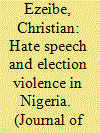

|
|
|
|
|
| Summary/Abstract |
Although research has considered how poor governance, exclusionary politics and electoral malpractice affect election violence, the effect of hate speech on election violence has not received adequate academic attention. Using a mixed methods approach with qualitative dominance, this study examines the effect of hate speech on election violence in Nigeria during the 2011, 2015 and 2019 presidential elections. The article demonstrates that an entrenched culture of hate speech is an oft-neglected major driver of election violence in Nigeria. The study concludes that the implementation of existing anti-hate speech laws presents an opportunity for protecting the rights of minority groups, promoting political inclusion and preventing election violence in Nigeria and beyond.
|
|
|
|
|
|
|
|
|
|
|
|
|
|
|
|
| 2 |
ID:
190934
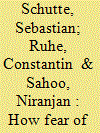

|
|
|
|
|
| Summary/Abstract |
Earlier research on ethnic and religious conflict has identified fear as an important motivation. While theoretically sound, this expectation has never been tested at larger scales in ongoing episodes of political violence. Instead, conceptual progress has been made in lab experiments. Combining insights from observational research and stylized experiments, we predict that fear for personal safety due to witnessed violence causes prejudice against out-groups, enhanced internal cohesion, and support for extremist actors. To test these predictions, we conducted surveys in the Indian State of Uttar Pradesh with identical respondents in three waves starting in January 2017. The surveys continued during the tense Legislative Assembly elections in the Spring. The results largely corroborate the theoretical expectations and present a hard in-vivo test of long-standing conjectures.
|
|
|
|
|
|
|
|
|
|
|
|
|
|
|
|
| 3 |
ID:
154255
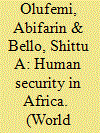

|
|
|
|
|
| Summary/Abstract |
This paper explores the terrain of human security as a primary purpose of governance and contends that the failure of any government to safeguard the security of its citizenry is a failure of governance. It discusses traditional, modern and compromise based views of security. The authors observe that election violence and the “sit tight” syndrome of African leaders have ravaged the continent and kept it backward and poor. They conclude that an adherence to democracy, good governance and the rule of law is the only panacea for human security in Africa.
|
|
|
|
|
|
|
|
|
|
|
|
|
|
|
|
| 4 |
ID:
170814


|
|
|
|
|
| Summary/Abstract |
False information, rumours and hate speech can incite violent protest and rioting during electoral periods. To counter such disinformation, United Nations peacekeeping operations (PKOs) routinely organize election-education events. While researchers tend to study how PKOs affect armed group and state behaviour, this study shifts the focus to civilians. It argues that PKOs’ election education reduces violent protest and rioting involving civilians during electoral periods via three pathways. First, learning about PKOs’ electoral security assistance during election-education events may convince people that political opponents cannot violently disturb elections, thereby mitigating fears of election violence. Second, election-education events provide politically relevant information that can strengthen political efficacy and people’s ability to make use of peaceful political channels. Finally, peace messages during election-education events can change people’s calculus about the utility and appropriateness of violent behaviour. Together, these activities mitigate fears, reduce political alienation and counter civilians’ willingness to get involved in violence. To test these expectations, I combine survey data on people’ perceptions and attitudes, events data on violent protest and rioting, and a novel dataset on local-level election-education events carried out by the PKO in Côte d’Ivoire before four elections held between 2010 and 2016. The results show that when the PKO is perceived to be an impartial arbiter, its election-education events have violence-mitigating effects at the individual and subnational levels.
|
|
|
|
|
|
|
|
|
|
|
|
|
|
|
|
| 5 |
ID:
092985
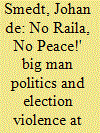

|
|
|
|
|
| Publication |
2009.
|
| Summary/Abstract |
This article investigates the relationship between national politics and local violence in the aftermath of Kenya's 2007 election. Focusing on the Kibera slum, the article shows that while the area's 'big man' Raila Odinga at times appeared to have a strong hold over his constituents at the grassroots, patrimonialism and big man politics cannot provide a full explanation of the post-election violence. Instead, local socio-economic factors played a key role and lent the conflict its own specific dynamics. The article also shows that while Raila's strong patron-client relationship with Kibera residents has empowered him as a national politician, in his current role as Prime Minister this relationship restricts his political room for manoeuvre. Thus the focus on Raila's 'big man' status in Kibera illustrates the pressures faced by Kenyan politicians in mediating between their public roles and the demands of their constituents.
|
|
|
|
|
|
|
|
|
|
|
|
|
|
|
|
| 6 |
ID:
170807
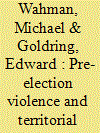

|
|
|
|
|
| Summary/Abstract |
Cross-national research on African electoral politics has argued that competition increases the prospects for pre-election violence. However, there is a dearth of systematic research on the effect of political competition on pre-election violence at the subnational level. We theorize that in African democracies characterized by competition at the national level but low subnational competitiveness (polarization), violence is often a manifestation of turf war and a tool to maintain and disrupt political territorial control. Consequently, contrary to expectations derived from the cross-national literature, pre-election violence is more likely in uncompetitive than competitive constituencies. Locally dominant as well as locally weak parties have incentives to perpetrate violence in uncompetitive constituencies. For locally dominant parties, violence is a tool to shrink the democratic space in their strongholds and maintain territorial control. For locally weak parties, violence can disturb the dominance of the opponent and protect their presence in hostile territory. We hypothesize that pre-election violence will be particularly common in opposition strongholds. In such locations, ruling parties can leverage their superior repressive resources to defend their ability to campaign, while the opposition can use their local capacity to reinforce the politics of territoriality. We test our hypotheses with original constituency-level election violence data from the 2016 Zambian elections. Data come from expert surveys of domestic election observers and represent a novel way of measuring low-level variations in election violence. Our analysis shows patterns of pre-election violence consistent with our theory on pre-election violence as a territorial tool.
|
|
|
|
|
|
|
|
|
|
|
|
|
|
|
|
| 7 |
ID:
170804
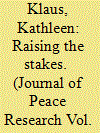

|
|
|
|
|
| Summary/Abstract |
How does large-scale land reform affect electoral stability and the prospects for election violence? While scholars have theorized elite-level logics of land distribution, few studies analyze the effects of land reform on the attitudes of ordinary citizens, and the implications such reforms have for electoral violence. The article uses an original survey and qualitative interviews in coastal Kenya to examine the effects of the Kenyan government’s recent land titling campaign, the most ambitious and extensive since independence. It theorizes and tests the micro-mechanisms through which the selective distribution of land rights in the pre-electoral period heightens or lowers the stakes of an electoral outcome by altering levels of political trust and perceived threat. Results indicate that title deed beneficiaries are more likely to trust political institutions than non-beneficiaries. Yet, while title deed recipients are more likely to trust state institutions, they are also more likely to fear the electoral process compared to non-beneficiaries. The findings reveal how the perceived stakes of an election can vary across local spaces. Where political trust is low and threat is high, citizens may view elections as particularly high-stakes events and, thus, may be more willing to take on the costs of participation in violence to ensure their preferred political outcome, or to defend themselves against anticipated attacks.
|
|
|
|
|
|
|
|
|
|
|
|
|
|
|
|
| 8 |
ID:
170813
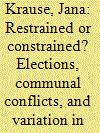

|
|
|
|
|
| Summary/Abstract |
Anecdotal evidence suggests that sexual violence varies significantly across cases of election violence and communal conflicts but systematic research is scarce. Post-election violence is particularly likely if electoral mobilization further polarizes longstanding communal conflicts and political elites do not instruct security forces to intervene decisively. I comparatively analyse two prominent cases of post-election violence in Kenya (2007/8) and Nigeria (2008) that exhibit stark variation in sexual violence. Patrimonial networks and norms of violent masculinity that increase the probability of (gang) rape were present in both cases and do not explain variation. Civil war research has identified three explanations for the variation in sexual violence: situational constraints; ordered sexual violence or restraint; and bottom-up dynamics of sexual violence or restraint. I examine these for the context of post-election violence. I argue that the type of communal conflict triggered by electoral mobilization explains variation in sexual violence. In Kenya, pogroms of a majority group against a minority allowed for the time and space to perpetrate widespread sexual violence while in Nigeria, dyadic clashes between similarly strong groups offered less opportunity but produced a significantly higher death toll. These findings have important implications for preventing election violence. They demonstrate that civilian vulnerability is gendered and that high levels of sexual violence do not necessarily correspond to high levels of lethal violence. Ignoring sexual violence means underestimating the real intensity of conflict and its impact on the political process.
|
|
|
|
|
|
|
|
|
|
|
|
|
|
|
|
| 9 |
ID:
179934
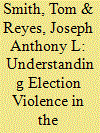

|
|
|
|
|
| Summary/Abstract |
Despite election violence being a commonly agreed upon phenomena in the Philippines, there had been a dearth in academic research in recent years, largely due to the lack of reliable sources of information. To address this, this article adapts recognised methods from studies such as Newman’s 2013 paper, together with McGrath and Gill’s 2014 research on terrorism and elections. To expose the timing of election violence, incidents were tracked relative to election dates for the period from 2004–2017, with the results indicating violence increases closer to an election date, and frequency substantially increased during the 14-year period. This is the first academic journal article since Linantud in 1998 to focus on the issue of election violence in the Philippines but through adaptive methodologies goes further to make national analysis. Furthermore, findings reveal statistically significant differences on the types of terrorist attacks and types of targets when comparing election and non-election periods. Complicating factors are explored in relation to majority of attacks attributed to ‘unknown’ actors and the complex situation during elections. The results also demonstrate that election violence in the Philippines is dominated by the New People’s Army and the use of assassination. The paper makes the case for further research and the creation of a dedicated database of election violence in the Philippines and elsewhere, and finally evaluating these few measures implemented by the government that have failed to stem election violence.
|
|
|
|
|
|
|
|
|
|
|
|
|
|
|
|
| 10 |
ID:
170811
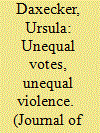

|
|
|
|
|
| Summary/Abstract |
Elections held outside of advanced, industrialized democracies can turn violent because elites use coercion to demobilize political opponents. The literature has established that closely contested elections are associated with more violence. I depart from this emphasis on competitiveness by highlighting how institutional biases in electoral systems, in particular uneven apportionment, affect incentives for violence. Malapportionment refers to a discrepancy between the share of legislative seats and the share of population, violating the ‘one person, one vote’ principle. Drawing on recent work on malapportionment establishing that overrepresented districts are targeted with clientelist strategies, are more homogenous, and are biased in favor of district-level incumbent parties, I argue that overrepresented districts present fewer incentives for using violence. In contrast, elites in well-apportioned or underrepresented districts exert less control over electoral outcomes because such districts have more heterogenous voter preferences, raising incumbent and opposition demands to employ violence. I examine the effects of malapportionment on violence using constituency-level elections data and new, disaggregated, and geocoded event data on the incidence of election violence in India. Results from six parliamentary elections from 1991 to 2009 show that electoral violence is less prevalent in overrepresented constituencies, and that violence increases in equally apportioned and moderately underrepresented districts. The analysis establishes additional observable implications of the argument for district voter homogeneity and incumbent victory, accounts for confounders such as urbanization and state-level partisanship, and validates measures of election violence. The findings illustrate that institutional biases shape incentives for electoral violence.
|
|
|
|
|
|
|
|
|
|
|
|
|
|
|
|
|
|
|
|
|